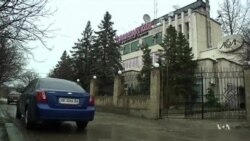There is growing concern that Russia or Russian surrogates are trying to restrict independent media coverage of unfolding events in Ukraine, including Crimea. There have been numerous incidents of harassment of international journalists, and Russia recently took over Ukrainian broadcast frequencies, raising alarms that Moscow is trying to silence opposition voices.
At one point during a pro-Russia demonstration in the eastern Ukrainian city of Kharkiv, protesters turned their anger toward Voice of America correspondent Daniel Schearf and his translator. Shearf described what happened.
“A large crowd encircled us, you know maybe three, four, five people deep. And we were obviously surrounded,” he said.
In this case, the verbal assault did not turn violent but, as seen in one YouTube video, a Bulgarian journalist in Crimea was attacked by masked men as he tried to take pictures of them removing equipment from a TV studio.
Nina Ognianova with the Committee to Protect Journalists says that journalist organizations are documenting an increasing number of acts of intimidation and physical attacks against those covering the crisis in Ukraine.
“Men who in several most recent events have kidnapped at least two journalists, assaulted several reporters, kept reporters at gunpoint and obstructed them from entering the region,” she said.
Russian state television also has taken over the broadcast frequency used by Crimea’s Black Sea TV, as well as two other stations in Kyiv.
Ognianova says the clampdown on the media makes it more difficult to find a peaceful solution to the crisis as pro-Russian forces exert more control over Ukraine’s Crimean peninsula.
“A plurality of views is crucial in this time of crisis," she said. "If there is going to be a conflict resolution, this is the only way that this conflict could be resolved.”
Dunja Mijatovic with the Organization for Security and Cooperation in Europe also has urged all parties to permit journalists to report safely and without fear of reprisal.
"The most important thing is that you stay safe and this is my message to everyone: 'Hands off media, hands off journalists, law enforcement agencies make sure that they are safe,'" she said "And that would be a message from the OSCE representative of the media."
These advocates for freedom of the press say silencing media is not acceptable, especially in times of crisis.
At one point during a pro-Russia demonstration in the eastern Ukrainian city of Kharkiv, protesters turned their anger toward Voice of America correspondent Daniel Schearf and his translator. Shearf described what happened.
“A large crowd encircled us, you know maybe three, four, five people deep. And we were obviously surrounded,” he said.
In this case, the verbal assault did not turn violent but, as seen in one YouTube video, a Bulgarian journalist in Crimea was attacked by masked men as he tried to take pictures of them removing equipment from a TV studio.
Nina Ognianova with the Committee to Protect Journalists says that journalist organizations are documenting an increasing number of acts of intimidation and physical attacks against those covering the crisis in Ukraine.
“Men who in several most recent events have kidnapped at least two journalists, assaulted several reporters, kept reporters at gunpoint and obstructed them from entering the region,” she said.
Russian state television also has taken over the broadcast frequency used by Crimea’s Black Sea TV, as well as two other stations in Kyiv.
Ognianova says the clampdown on the media makes it more difficult to find a peaceful solution to the crisis as pro-Russian forces exert more control over Ukraine’s Crimean peninsula.
“A plurality of views is crucial in this time of crisis," she said. "If there is going to be a conflict resolution, this is the only way that this conflict could be resolved.”
Dunja Mijatovic with the Organization for Security and Cooperation in Europe also has urged all parties to permit journalists to report safely and without fear of reprisal.
"The most important thing is that you stay safe and this is my message to everyone: 'Hands off media, hands off journalists, law enforcement agencies make sure that they are safe,'" she said "And that would be a message from the OSCE representative of the media."
These advocates for freedom of the press say silencing media is not acceptable, especially in times of crisis.






